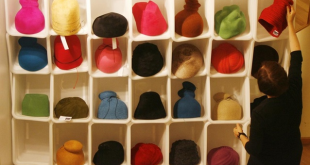Florian Fox © Rob Lewis Photography What’s it like to move back to – or away from – Switzerland during a pandemic? What does gold mined in Peru have to do with Switzerland? Did you know that “nostalgia” is a Swiss invention? Not content to mind her own business, Susan studied journalism in Boston so she’d have the perfect excuse to put herself in other people’s shoes and worlds. When not writing, she presents and produces podcasts and videos. More about the...
Read More »Recognition for our report from the Swiss mountains
Thanks to technology, journalist Sibilla Bondolfi was able to work in the region that she was researching: the Alps. (swissinfo.ch) A longform report that we published last autumn has been shortlisted for the Swiss Press Award. The nomination is an honour for our team. Can people in Switzerland really live and work wherever they want on account of the digital revolution? Even in the mountains? A longform multimedia report by SWI swissinfo.ch has the answer. Published...
Read More »Emergency funding made available for artists and designers
Workshops and studios for textile design, object design, jewellery design and graphic design are eligible for emergency funding (Keystone) People who work in the cultural sector in Switzerland can now apply for funds to cushion the impact of the Covid-19 pandemic. The Swiss government last month adopted a package of measures totalling CHF280 million ($287 million). On Monday the Federal Office of Culture explainedexternal link how the money is to be divided up:...
Read More »Businesses reach out to people at home
[embedded content] While most businesses have temporarily shut down, others are starting up or finding new ways to reach the public in their homes. Some Swiss farm shops, like Thierry Miauton’sexternal link in Oleyres, canton Fribourg, are delivering local produce to people’s doorsteps, so the clients don’t have to risk possible contact with virus-contaminated shoppers in supermarkets. The well-stocked farm shop can hardly keep up with demand and has taken on...
Read More »Yuval Noah Harari’s “Sapiens—A Brief History of Humankind”
Homo appeared roughly 2 million years ago in Africa and Homo sapiens roughly 200’000 years ago in East Africa. Harari divides his account of the last 70’000 years into four parts: The cognitive revolution (language), the agricultural revolution (about 10’000 years ago in today’s Turkey, Iran, Levant), the unification of humankind (through money, empire, and religion), and the scientific revolution. According to Harari, Sapiens developed more efficient strategies for cooperation than other...
Read More »Yuval Noah Harari’s “Sapiens—A Brief History of Humankind”
Homo appeared roughly 2 million years ago in Africa and Homo sapiens roughly 200’000 years ago in East Africa. Harari divides his account of the last 70’000 years into four parts: The cognitive revolution (language), the agricultural revolution (about 10’000 years ago in today’s Turkey, Iran, Levant), the unification of humankind (through money, empire, and religion), and the scientific revolution. According to Harari, Sapiens developed more efficient strategies for cooperation than other...
Read More »Swiss justice: Art collector must pay CHF11.4 million arrears on VAT
Swiss billionnaire and art collector Urs Schwarzenbach owns the most luxurious hotel in Zurich. Switzerland’s highest judicial authority has dismissed an appeal by the financier and art collector Urs Schwarzenbach who had been found guilty of tax evasion by lower courts. The Wednesday ruling by the Supreme Court obliges the 69-year-old billionaire – owner of The Dolder Grand Hotelexternal link in Zurich – to pay CHF11.4...
Read More »Trust in online content takes a big hit
Most internet users in Switzerland search the web for information about products, notably to buy online and book holidays (Keystone) - Click to enlarge Internet users in Switzerland rate their computer skills as good, but trust in online news content has dropped significantly, according to a survey by the University of Zurich. An overwhelming majority (83%) of users stated they can easily distinguish...
Read More » Swiss Economicblogs.org
Swiss Economicblogs.org






